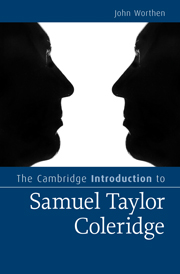Book contents
- Frontmatter
- Contents
- Illustrations
- Preface
- Acknowledgements
- Abbreviations
- Chapter 1 Early life and contexts: 1772–1802
- Chapter 2 Poetry
- Chapter 3 Notebooks
- Chapter 4 Mid-life works and contexts: 1803–1814
- Chapter 5 Language
- Chapter 6 Criticism
- Chapter 7 Later works and contexts: 1815–1834
- Afterword
- Notes
- Further reading
- Index
- Cambridge Introductions to Literature
Chapter 7 - Later works and contexts: 1815–1834
Published online by Cambridge University Press: 05 August 2012
- Frontmatter
- Contents
- Illustrations
- Preface
- Acknowledgements
- Abbreviations
- Chapter 1 Early life and contexts: 1772–1802
- Chapter 2 Poetry
- Chapter 3 Notebooks
- Chapter 4 Mid-life works and contexts: 1803–1814
- Chapter 5 Language
- Chapter 6 Criticism
- Chapter 7 Later works and contexts: 1815–1834
- Afterword
- Notes
- Further reading
- Index
- Cambridge Introductions to Literature
Summary
Coleridge's crisis in his early forties was brought to an end by his placing himself in the hands of people (first the Morgans, then the Gillmans) who were prepared to care for him. With their encouragement and help he was able to find a kind of equilibrium in his opium use between quantities that provoked withdrawal symptoms and quantities that made it nearly impossible for him to function.
As late as 1814, while aware that opium was the cause of his problems, Coleridge had only been able to understand his illness as that of an ‘utter impotence of the Volition’; it felt as if his will had been afflicted by a kind of madness (CLii. 953). In 1820, however, he would describe how ‘my Body had contracted a habit & a necessity’, which was a clear step forward in locating the problem not within the domain of will-power but within the body itself. He still nevertheless felt horribly responsible for his ‘defect of fortitude’ and ‘cowardice of pain’ (CLv. 80, CNii. 2495) in not being able to withstand the agonies of withdrawal: ‘loathes while he takes, yet still takes, goaded on by pain, and more than pain, and by the dread of both’ (CMv. 419). De Quincey's Confessions of an English Opium Eater of 1821, in which the author boasted of having triumphed over his opium habit, would, however, have confirmed to Coleridge's acquaintances that (as they suspected) he was simply not trying hard enough.
- Type
- Chapter
- Information
- The Cambridge Introduction to Samuel Taylor Coleridge , pp. 113 - 129Publisher: Cambridge University PressPrint publication year: 2010



